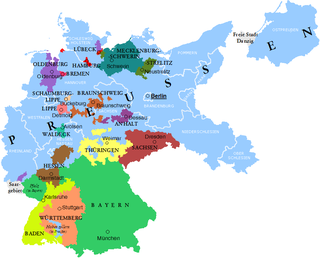Related Research Articles

Dieburg is a small town in southern Hesse, Germany. It was formerly the seat of the district ("Kreis") of Dieburg, but is now part of the district of Darmstadt-Dieburg.
Volksstaat or Volkstaat may refer to:

The People's State of Hesse was one of the constituent states of Germany from 1918 to 1945, as the successor to the Grand Duchy of Hesse after the defeat of the German Empire in World War I, on the territory of the current German states of Hesse and the Rhineland-Palatinate. The State was established after Grand Duke Ernest Louis was deposed on 9 November 1918. The term "People's State" referred to the fact that the new state was a Republic and was used in the same manner as the term Free State, which was employed by most of the other German States in this period.
The 1919 Württemberg state election was held on 12 January 1919 to elect the 150 members of the Württemberg state constituent assembly.
The 1920 Württemberg state election was held on 6 June 1920 to elect the 101 members of the Landtag of the Free People's State of Württemberg.
The 1924 Württemberg state election was held on 4 May 1924 to elect the 80 members of the Landtag of the Free People's State of Württemberg.
The 1928 Württemberg state election was held on 20 May 1928 to elect the 80 members of the Landtag of the Free People's State of Württemberg.
The 1932 Württemberg state election was held on 24 April 1932 to elect the 80 members of the Landtag of the Free People's State of Württemberg.
The 1919 Hessian state election was held on 26 January 1919 to elect the 70 members of the Hessian constituent people's assembly.
The 1921 Hessian state election was held on 27 November 1921 to elect the 70 members of the Landtag of Hesse.
The 1924 Hessian state election was held on 7 December 1924 to elect the 70 members of the Landtag of Hesse.
The 1927 Hessian state election was held on 13 November 1927 to elect the 70 members of the Landtag of Hesse.
The 1932 Hessian state election was held on 19 June 1932 to elect the 70 members of the Landtag of Hesse.
The 1919 Reuss-Gera state election was held on 2 February 1919 to elect the 21 members of the Landtag of Reuss-Gera.
The 1919 Reuss-Greiz state election was held on 2 February 1919 to elect the 15 members of the Landtag of Reuss-Greiz.
The 1919 Saxe-Meiningen state election was held on 9 March 1919 to elect the 24 members of the Landtag of Saxe-Meiningen.
The 1919 Saxe-Weimar-Eisenach state election was held on 9 March 1919 to elect the 42 members of the Landtag of Saxe-Weimar-Eisenach.
The 1931 Oldenburg state election was held on 17 May 1931 to elect the 48 members of the Landtag of the Free State of Oldenburg.

Landtag elections in the People's State of Hesse (Volksstaat Hessen) during the Weimar Republic were held at irregular intervals between 1919 and 1932. Results with regard to the total vote, the percentage of the vote won and the number of seats allocated to each party are presented in the tables below. On 31 March 1933, the sitting Landtag was dissolved by the Nazi-controlled central government and reconstituted to reflect the distribution of seats in the national Reichstag. The Landtag subsequently was formally abolished as a result of the "Law on the Reconstruction of the Reich" of 30 January 1934 which replaced the German federal system with a unitary state.

Landtag elections in the Free State of Oldenburg (Freistaat Oldenburg) during the Weimar Republic were held at irregular intervals between 1919 and 1932. Results with regard to the total vote, the percentage of the vote won and the number of seats allocated to each party are presented in the tables below. On 31 March 1933, the sitting Landtag was dissolved by the Nazi-controlled central government and reconstituted to reflect the distribution of seats in the national Reichstag. The Landtag subsequently was formally abolished as a result of the "Law on the Reconstruction of the Reich" of 30 January 1934 which replaced the German federal system with a unitary state.
References
- 1 2 Gonschior, Andreas. "Der Volksstaat Hessen Landtagswahl 1931". Wahlen in der Weimarer Republik. Archived from the original on 2001-05-25. Retrieved 18 May 2021.
- ↑ Schröder, Valentin. "Landtagswahlen Volksstaat Hessen". Wahlen in Deutschland. Archived from the original on 2005-02-24. Retrieved 16 May 2021.